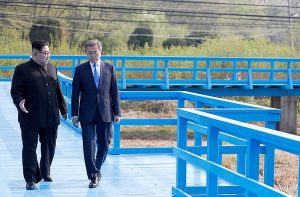A key message during the South Korean President Moon Jae-in’s New Year’s press conference, held on January 14, was that the South Korean government would seek ways to boost inter-Korean cooperation. Throughout the 90 minutes of the conference, Moon iterated on four instances that South Korea will no longer be a bystander to the U.S.-North Korea talks but will actively expand areas of cooperation with the North. While reinvigorated inter-Korean relations could indeed be a positive thing, there are reasons to exercise caution.
The rationale behind Moon’s bolstered enthusiasm is supported by two arguments. First, improvements in inter-Korean relations can breathe fresh air into the U.S.-North Korea talks, which have largely stalled since the Hanoi Summit in February 2019. Moon notes that although talks have not yet collapsed, domestic politics in the United States surrounding the presidential elections in November 2020 will make it difficult for Trump to allocate time to talks with Pyongyang. However, although North Korea announced a “head-on battle” to overcome its “hostile environment,” the demonstration of restraint during the end-of-year tensions indicates that Kim Jong Un has yet to sever dialogue with the United States. Second, Moon takes it as a positive sign that “North Korea has not rejected inter-Korean dialogue to further inter-Korean relations or cooperation.”
To this end, Moon offered a number of proposals during his New Year’s Address on January 7: development of the border regions, sports exchanges, linking rail and road transportation, registering the demilitarized zone as a UNESCO World Heritage Site, and arranging Kim’s visit to South Korea. During the press conference, Moon also mentioned tourism, joint entry and teams in this year’s Tokyo Olympics, and a bid to co-host the 2032 Olympics as specific areas of cooperation.
The Moon administration’s earnestness is backed by multifaceted efforts to set the groundwork for increased inter-Korean relations. Last week, it was announced that the Ministry of Unification would expand its bureau for inter-Korean cooperation. Also last week, Moon Chung-in, special adviser to the president, sent a clear message in Washington D.C. when he commented that South Korea may need to pursue an independent path toward inter-Korean economic cooperation. The message was repeated by Foreign Minister Kang Kyung-wha on January 15, after meeting with her U.S. and Japanese counterparts in the United States.
However, there are reasons to exercise caution. At present, South Korea does not have a position of strength. Moon has two years left in his term and has yet to make tangible accomplishments on North Korea’s denuclearization. There is a real possibility that Moon’s term will end on an anti-climactic note and this could explain why the administration has doubled down on the Korean peace process. It could also explain why the administration has been exercising extraordinary restraint toward North Korea’s recent verbal attacks.
For example, North Korean media responded to Moon’s New Year’s address by calling him (indirectly) an “idiot” and slamming his inter-Korean proposals as “presumptuously caught up in self-admiration.” North Korea also snubbed South Korea after national security council director Chung Eui-yong conveyed Trump’s birthday message to Kim Jong Un. In response, Seoul’s Ministry of Unification simply called for “mutual respect.”
In contrast, North Korea is in a position to put off inter-Korean relations, especially when doing so would consume Moon’s dwindling time in office. Rather than using up South Korea’s good will, Kim’s calculation is that Pyongyang can exploit the Moon administration’s increasing desire for achievements to obtain greater concessions. Therefore, unless inter-Korean projects include wide sanctions relief, Moon’s current proposals are unlike to capture Kim’s attention.
If North Korea does agree to inter-Korean projects, the Moon administration will need to tread with even more caution. Months of insult-hurling leading to joint projects sets the wrong tone for future inter-Korean communication. Specific projects could also hit a nerve with the domestic public. For example, resuming Mount Kumgang tourism is a point of contention. Moon’s proposal for joint teams in the Tokyo Olympic is also unlikely to be received favorably, given the reaction of the South Korean public after the South-North joint ice hockey team at the 2018 PyeongChang Olympics. At any rate, given North Korea’s recent messages about a “new strategic weapon,” too forceful a push by Moon to improve inter-Korean relations will end up alienating the South Korean public.
A final word of caution would be managing South Korea’s relations with the United States. Moon iterated during the press conference that South Korea-U.S. relations are “stronger than ever” and that South Korea has communicated to the United States about the positive role of inter-Korean projects in breaking the denuclearization stalemate. However, Moon’s proposals come in the context of an impasse in defense cost talks and the question of sending South Korean troops to the Strait of Hormuz to support U.S.-led security operations. While needing to refrain from alarmist reactions, managing the optics of a strong South Korea-U.S. alliance will need more attention.
For Moon Jae-in, 2020 clearly marks a new role for South Korea. 2018 was about bringing North Korea to the negotiation table and 2019 was about holding back inter-Korean relations to promote U.S.-North Korea talks on denuclearization. 2020 will be about inter-Korean cooperation to improve inter-Korean relations and boost U.S.-North Korea dialogue. While the idea is noble, without a minimal level of reciprocity or diplomatic decorum on the part of North Korea, Moon’s continued push for inter-Korean relations inevitably looks as though he is motivated mostly by his and his administration’s legacy.
Saeme Kim is a Ph.D. candidate at King’s College London. Her research interests include Asian regionalism, security in Northeast Asia, and middle power diplomacy.

































